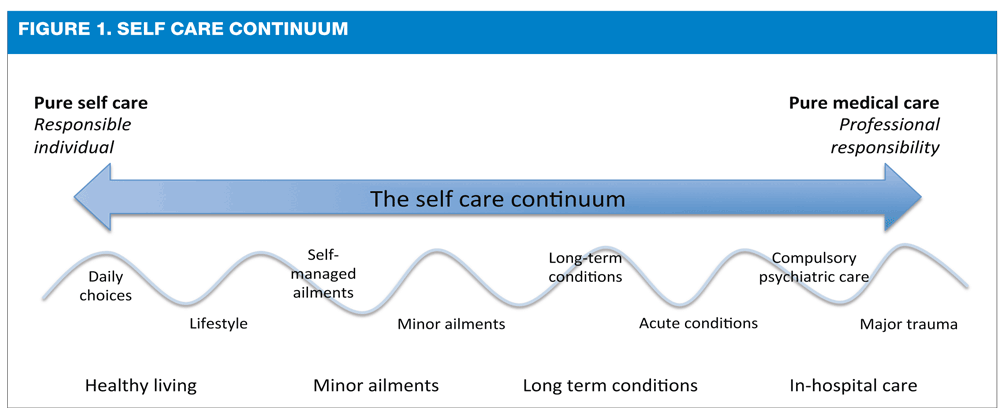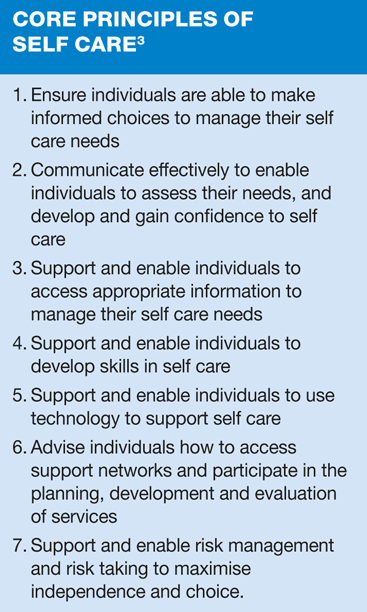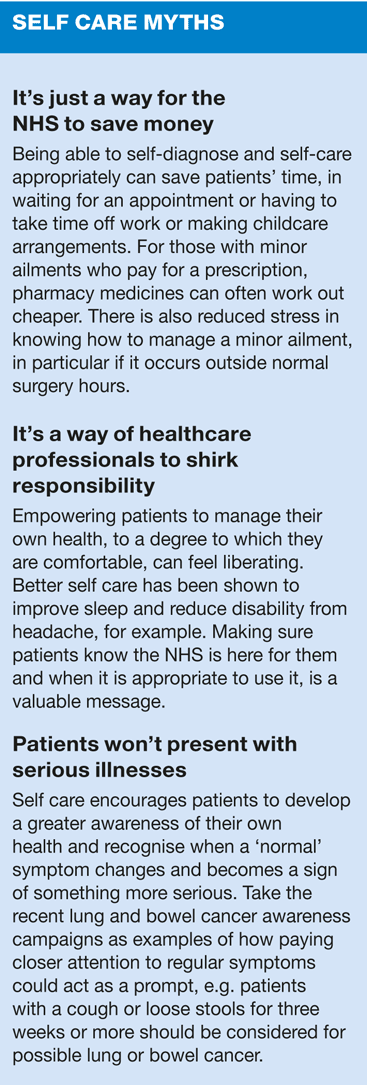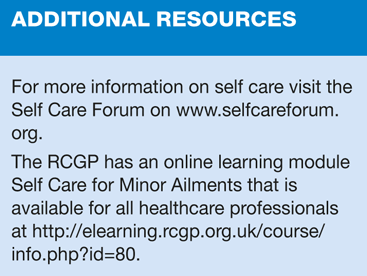Self care - a nursing essential
Sara Richards RN
Sara Richards RN
Specialist Primary Care Nurse, Practice Nurse Facilitator
Berkshire Self Care Forum Board member
Long before the advent of modern medicine, self care was the only means of improving health and wellbeing. So why does the concept of self care seem new? And what does it mean for practice nurses?
While the NHS has achieved great things in the past 64 years, it has also - to its detriment - been successful in shifting the responsibility of care from the individual to the healthcare professional.
But that has to change. A recent Deloitte report highlighted some of the issues facing primary care: increased life expectancy; more complex health challenges; and a rise in the number of people living with chronic, long-term complaints.1 The report's key recommendation was the need for general practice to move from treating episodic illness to working in partnership with patients and other providers to create shared decision-making strategies that tackle chronic conditions.1
Coupled with the structural changes happening within the NHS, now is the ideal time to re-evaluate the way healthcare is managed to ensure the NHS can continue to survive. Now is the time to put self care back at the heart of healthcare.
DEFINING SELF CARE
Put simply, self care is about encouraging and empowering people to take care of their own health. Self care has a role in the health decisions people make for themselves and their families to get and stay fit, both physically and mentally. Self care can be further divided into two areas: prevention and active management:
- Prevention via healthy eating, weight management and exercise
- Active intervention via risk factor reduction (weight control, smoking cessation and alcohol reduction), management of minor ailments and long-term conditions.
At one end of the spectrum the individual is wholly responsible for their health and wellbeing, at the other end responsibility lies solely with the healthcare professional. In the vast majority of cases, outside of major trauma and surgery, self care has a role throughout this continuum (see
THE NHS AND SELF CARE
Back in 2002, the Wanless report took the first evidence-based assessment of the long-term resource requirements for the NHS.2 It concluded that to meet people's health expectations and to deliver higher quality healthcare over the next 20 years there was a need to dedicate additional resources. The specific resources required would depend on the health needs and demands of the population, technology developments and workforce issues, as outlined in three scenarios:
- Slow uptake - no change in the level of public engagement, life expectancy shows the least improvement of all scenarios and overall health status remains constant or deteriorates
- Solid progress - people become more engaged with their health, resulting in improved health status, increased life expectancy and understanding of how to use the primary care system appropriately
- Fully engaged - the level of public engagement in health is high, life expectancy increases or outstrips current forecasts, health status improves dramatically with people confident in the health system and demand high quality care.
In the intervening 10 years, while there have been some improvements in life expectancy and health status many of these have been driven by other factors, such as the smoking ban. The reality is that there has been slow uptake when it comes to people being more engaged in their health and undertaking self care measures.
But is this a surprise? There has been no cohesive, consistent approach in encouraging patients to self care. What advice do nurses currently give to patients who present with minor ailments or who are managing a long-term condition? Is self care promoted, is self care advice provided? Do patients walk away feeling empowered that they are the best person to manage their condition, while knowing the NHS is there for advice and support when needed?
To ensure self care is embedded in everyday healthy living a fundamental behaviour shift is required to move people from 'I have to see the doctor/nurse to know what action to take', to 'I know what is the right action to take for me and if that doesn't work then I will see the doctor/nurse for advice'.
MOTIVATING SELF CARE
The principles of behaviour change make it clear that telling people to implement self care or telling them they are at risk of developing disease is rarely effective.4 Patients will only change if they reach the conclusion that change is of value.4 Multiple interventions are often required to prompt the patient to consider change and reach their own decision. The NHS needs to ensure patients are informed and prompted about self care at every intervention, at every level of the NHS in order to facilitate this behaviour change.
As healthcare professionals, we are encouraged to implement motivational interviewing around disease states, such as stopping smoking or sexual health. I believe we should go wider and focus on self care as the starting point for behaviour change as building up patients' confidence in their ability to take small health steps can be the gateway to greater health gains.
The best training in encouraging patients to take small health steps lies in the management of minor ailments. Research shows that minor ailments account for 20% of a general practice workload, a total of 220,000 consultations per day or 57 million per year.5 Of these, 90% of consultations are for minor ailments alone, costing the NHS around £2 billion per annum.5
Promoting individual responsibility for minor ailments allows patient confidence in self care to be increased, while treating a minor ailment with a prescription succeeds in disempowering patients. Data reveal 84% of those who have experience with self care feel confident in managing new episodes.6 In contrast, 62% of patients opt to return to the GP or nurse if a prescription is issued for a previous minor ailment episode.6
While this has a benefit to the practice, in terms of reduced consultations allowing more time to be spent on long-term and serious acute conditions, it also benefits the patient. Being able to initiate self care as soon as a minor ailment happens rather than waiting for a surgery appointment also frees up patient time. Undertaking self care at night, or on holiday or on a work trip can also help reduce the stress of not knowing what action to take. In short, it puts the patient back in control, in their own time and at their own choosing. That is the fundamental core principle of self care.
My personal experience is that patients who have tried self care are more open to suggestions to improve their health. It creates a shared, partnership approach and actually makes for a more relaxed appointment.
LONG-TERM CONDITIONS
The greater burden on the NHS is long-term conditions, however. An estimated 15.4 million people in England have at least one long-term condition.7 Around 65% of older people have two or more long-term conditions, with some having as many as five or six.8
The impact of long-term conditions on the NHS is increasing. Between 1995-2008, the number of patient consultations in England rose by over a third, from 217 million to 300 million.9 There has also been a shift in general practice in terms of who undertakes consultations. In 1995, GPs handled 76% of consultations and nurses 21%; by 2008 this was 62% and 34% respectively.9 If the pattern continues, then by 2035, there will be 433 million consultations per annum, with 180 million for those aged 65 or over.1 The increasing burden on nursing may be unsustainable.
Self care can play a critical role in helping to change this picture. The average diabetic spends six hours per year face-to-face with a healthcare professional. It is the decisions they make in the remaining 8,754 hours that will impact on the quality and duration of their life. By helping them make good choices and providing support in making these decisions, nurses can positively affect health outcomes in this patient population, as well as others with long-term conditions.
Demonstrable benefits have been seen in the Joining Up Self Care (JUSC) project in Erewash PCT. This examined one long-term condition, adult asthma, and considered the impact of self care on management. Patients participating in an asthma Expert Patient Programme or who had attended a half-day 'taster' session, had an increased appreciation of ways to manage their asthma, were less worried about side effects of treatment and felt more confident in discussing their condition with healthcare professionals,10 compared with the control group. In addition, participants had a greater understanding of how to reduce asthma symptoms and what to expect from nurses when it came to managing their condition.10
From a nursing perspective, evidence from the Expert Patient Programme shows that, on average, patients with asthma, COPD or diabetes had four fewer nurse consultations per annum.11 Adding this to the other savings of GP and specialist consultation and admission, resulted in an average saving per long-term condition patient of between £1664-£1848 each year.11
It's not just an NHS saving, the same research found patients had reduced time off work due to sickness and felt transformed from being a patient to a person who can play an active role in society.11
SUMMARY
Health care costs and the management of long term conditions are continuing to rise. The impact on the NHS cannot be ignored. To change the future of the NHS and optimise the management of long-term complaints, promoting self care is increasing essential for the nursing team. Waiting until a patient is faced with a condition that they will have to manage for the rest of their life and then asking them to self care is, understandably, likely to result in some pushback. Far better to be having self care conversations earlier, by encouraging prevention and minor ailments management, so the leap to self care is not so great.
As practice nurses we can change the future of the NHS and help ensure its survival by initiating and promoting self care at every available opportunity.
How to implement self care in nursing practice will be the subject of the next article in this series.
REFERENCES
1. Deloitte Centre for Health Solutions. Primary care: Today and tomorrow. Improving general practice by working differently. 2012.
2. Wanless D. Securing our future health: taking a long-term view. Final report. London: HM Treasury, 2002.
3. Skills for health, Skills for care. Common core principles to support self care. A guide to support implementation. May 2008.
4. Rollnick S, et al. Consultations about change behaviour. BMJ, BMJ 2005;331:961-3.
5. Pillay N, et al. The economic burden of minor ailments on the national health service (NHS) in the UK. SelfCare 2010;1(3):105-116.
6. Banks I. Self care of minor ailments: a survey of consumer and healthcare professional beliefs and behaviour. SelfCare 2010;1:1-13.
7. The Kings Fund. Long-term conditions. Available at: http://www.kingsfund.org.uk/topics/longterm_conditions/index.html.
8. Haslam D. The future of general practice. The role of primary care in the new NHS. PSM. 2005;9:16.
9. QResearch and the NHS Information Centre for Health and Social Care. Trends in consultation rates in general practice 1995 to 2008: analysis of the QResearch database.
10. Working in Partnership Programme and Proprietary Association of Great Britain. Self Care Aware. Joined up self care. What is the community impact of a coordinated approach to self care. The outcome of an action research project in Erewash PCT.
11. Expert Patients Programme Community Interest Company. Self care reduces costs and improves health - the evidence.
Related articles
View all Articles





